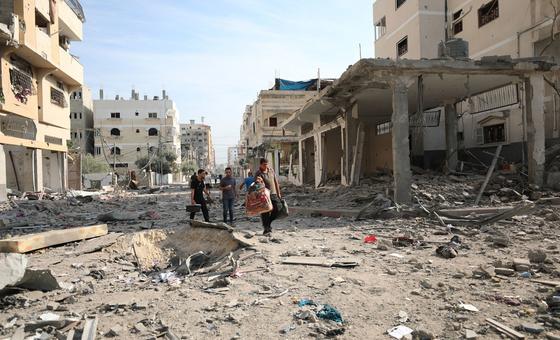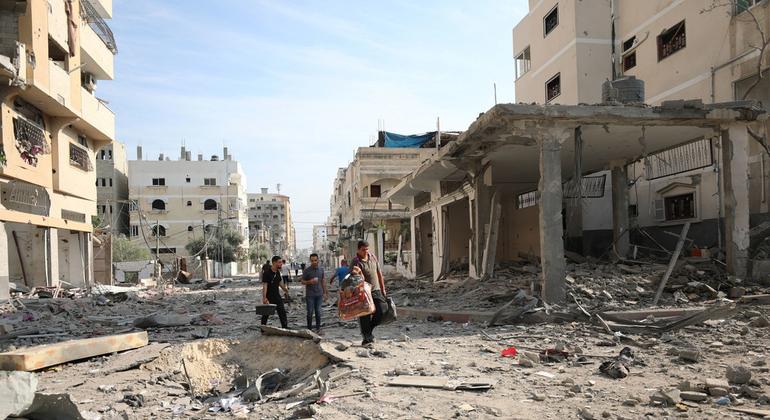
In a joint statement 27 aid organisations including UN agencies and their partners issued a call for an immediate stop to the fighting, stressing that conditions in Gaza are “amongst the worst we have witnessed”.
Meanwhile on Thursday Israeli troops reportedly entered the southern Gaza town of Khan Younis, where hundreds of thousands of displaced people have been sheltering.
‘No food. Just bombs’
Intense Israeli bombardments across the Strip and rocket firing by Palestinian armed groups into Israel have continued over the past two days, UN humanitarian affairs coordination office OCHA said, and more than 100 people were reportedly killed on Wednesday in the bombardment of “multiple residential buildings” in Jabalia refugee camp in northern Gaza.
“Almost no one in Gaza has enough food. In some areas, nine out of 10 people went a full day and night with nothing to eat,” UN World Food Programme (WFP) representative in the occupied Palestinian territory, Samer AbdelJaber, wrote on social platform X, while UN Children’s Fund (UNICEF) spokesperson James Elder, who recently returned from Gaza, summed up conditions in the enclave as: “No water. No sanitation. No food. Just bombs.”
UN chief António Guterres called on the Security Council on Wednesday – invoking the rare but powerful Article 99 tool – to “press to avert a humanitarian catastrophe” and unite in a call for a full humanitarian ceasefire.
In a letter to the Council, which is expected to meet in a special session in the coming days, he highlighted the “potentially irreversible implications for Palestinians as a whole and for peace and security in the region”.
‘We need peace for health’
UN health agency WHO chief Tedros Adhanom Ghebreyesus expressed support for Mr. Guterres’ letter, stressing that “Gaza’s health system is on its knees”.
“We need peace for health,” he insisted.
As of Wednesday, WHO had documented 212 attacks on healthcare in the Strip affecting 56 facilities and 59 ambulances. Only 14 out of Gaza’s 36 hospitals are at least partially operational.
The latest facility to stop functioning, the Kamal Adwan hospital in Jabalia, saw the evacuation of most patients and staff by the Gaza health authorities on Wednesday due to intense fighting and a lack of essentials.
“This will deprive thousands of people of essential lifesaving care,” WHO’s Tedros warned.
In a statement on Thursday a UN-appointed independent expert condemned Israel’s “unrelenting war” on the health system in Gaza. “We have descended into depths from which we must quickly emerge,” said Tlaleng Mofokeng, the UN Special Rapporteur on the right to health.
Special Rapporteurs are appointed by the UN Human Rights Council and are not UN staff; they do not receive payment for their work.
Aid distributions impeded
Meanwhile, stranded trucks, telecommunications blackouts and the inability of staff to report to the Rafah border crossing due to the hostilities have been limiting the UN’s ability to receive incoming aid, OCHA said.
For the fourth consecutive day on Wednesday Rafah was the only governorate in Gaza where aid distributions took place, as according to OCHA the intensity of the fighting “largely stopped” operations in the neighbouring Khan Younis governorate. There has been no access from the south to areas north of Wadi Gaza since the pause in fighting came to an end on 1 December.
On Wednesday 80 aid trucks and 69,000 litres of fuel entered through Rafah into Gaza – “well below the daily average of 170 trucks and 110,000 litres of fuel that had entered during the humanitarian pause”, OCHA stressed.
Evacuations in Khan Younis
The fighting in Khan Younis has pushed tens of thousands of people to flee to Rafah in the past few days, OCHA said. On Wednesday five schools run by UN agency for Palestine refugees UNRWA and serving as shelters in eastern Khan Younis governorate were evacuated following orders from the Israeli military.
Additionally, an area accounting for about a quarter of Khan Younis city was designated by the Israeli military for immediate evacuation.
In Rafah, shelters are over capacity and new arrivals have been settling in the streets and in empty spaces across the city. UNRWA is supporting the displaced with tents while WFP is distributing hot meals, in the midst of what the UN agency has dubbed a “catastrophic hunger crisis” across the Strip.



